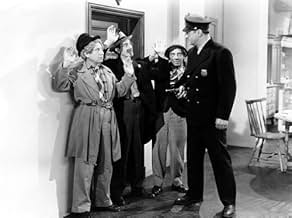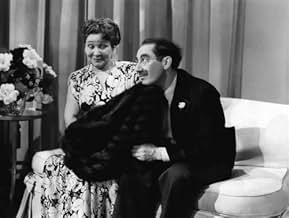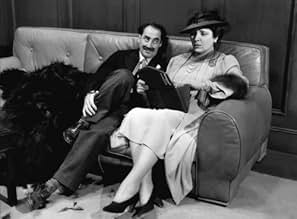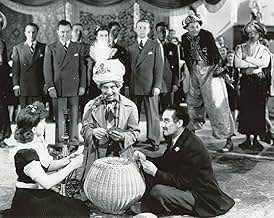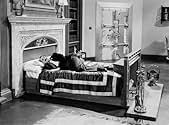IMDb रेटिंग
6.5/10
5.6 हज़ार
आपकी रेटिंग
अपनी भाषा में प्लॉट जोड़ेंA detective is hired to protect the life of a singer who has recently inherited a department store, from the store's crooked manager.A detective is hired to protect the life of a singer who has recently inherited a department store, from the store's crooked manager.A detective is hired to protect the life of a singer who has recently inherited a department store, from the store's crooked manager.
King Baggot
- Store Employee
- (बिना क्रेडिट के)
Marvin Bailey
- Member - Six Hits and a Miss
- (बिना क्रेडिट के)
फ़ीचर्ड समीक्षाएं
The Big Store is not one of the Marx Brothers' best films, but it's worth watching once. Groucho still delivers a few good one-liners and insults to Margaret Dumont. Harpo and Chico have some good scenes (watch as an Italian immigrant accuses Chico of mocking his accent!). I actually think that the musical numbers in this one are wonderful, except for those by Tony Rogers, one of the many love interest duds who grace the Brothers' flicks. Maltin's right: The Tenement Symphony is a suicide-inducing number, and easily a low point in all of the Marx Brothers' films, except for the entire running time of Love Happy. But there's a great song and dance number when Groucho first enters the store. You have to catch the woman singing a jazzed-up version of Rock-a-bye Baby; I have never seen a more eerily emotionless visage on a human being. It's creepy and oddly beautiful. Chico and Harpo perform an awesome piano duet. There's also a scene where four young kids play the piano like Chico, which is very charming. And Harpo's harp sequence is pretty good (he plays Mozart on the harp, and then his two reflections accompany him with other, various string instruments). The final chase sequence is rather annoying. The Marx Brothers' fall came about when their films started overutilizing special effects, fast motion, and sound effects to enhance the comedy. Still, The Big Store is not a disaster, by any means. 7/10.
After Zeppo Marx refused to move on with his brothers to MGM from Paramount, the Marxs usually secured the services of another player, usually a singer to function in Zeppo's nondescript place. Usually that person had a lot more personality than Zeppo did. It was Allan Jones in two films, Kenny Baker in one and in The Big Store it was Tony Martin.
The still very much alive, but retired Tony Martin, had one of the great voices of the last century. He never made the screen impact that other singers did, though he was in some very good films. His main media outlets were records, radio, and as one of the premier nightclub attractions, especially when he appeared with his second wife Cyd Charisse. Martin had two songs to sing in The Big Store, the much maligned Tenement Symphony and a really nice ballad, If It's You.
Martin is the heir to one half of Phelps Department store. The other half is owned by his aunt Margaret Dumont. The Hastings Brothers, who own a chain of department stores, are looking to buy this one.
Manager Douglass Dumbrille has been doing a little embezzling on the side and he's afraid that if Martin sells his half, he's taking a stretch up the river. After Martin becomes the victim of an attempted murder, Dumont hires who else, detective Wolf J. Flywheel who is of course Groucho Marx.
By a happy coincidence, Groucho has Harpo as a sidekick and Harpo's brother in the film Chico is a friend of Martin's. So now we have all the Marx Brothers working at the store.
The Big Store is usually dismissed as one of the Marx Brothers lesser films, but it's always been a favorite of mine. Another reviewer said there were too many musical numbers. I don't think there were any more or less than in other films of their's. The running time is a bit short so it might seem like there's more.
The highlight for me is always the final chase seen through the store, especially since Douglass Dumbrille joins in the fun. Dumbrille on screen usually plays some serious villains, probably his best known part is that of Mr. Cedar the lawyer who is milking the estate that Gary Cooper is inheriting in Mr. Deeds Goes to Town.
Dumbrille is just as successful dealing with the Marx Brothers over embezzlement as he is with Gary Cooper. But here this very serious and obviously classically trained actor joins right in the slapstick fun. Dumbrille looks like he's having a ball. Later on he would really cut loose in a couple of Abbott and Costello films.
A question to all movie fans. Who do you think had the most inventive screen character names, W.C. Fields or Groucho Marx?
The still very much alive, but retired Tony Martin, had one of the great voices of the last century. He never made the screen impact that other singers did, though he was in some very good films. His main media outlets were records, radio, and as one of the premier nightclub attractions, especially when he appeared with his second wife Cyd Charisse. Martin had two songs to sing in The Big Store, the much maligned Tenement Symphony and a really nice ballad, If It's You.
Martin is the heir to one half of Phelps Department store. The other half is owned by his aunt Margaret Dumont. The Hastings Brothers, who own a chain of department stores, are looking to buy this one.
Manager Douglass Dumbrille has been doing a little embezzling on the side and he's afraid that if Martin sells his half, he's taking a stretch up the river. After Martin becomes the victim of an attempted murder, Dumont hires who else, detective Wolf J. Flywheel who is of course Groucho Marx.
By a happy coincidence, Groucho has Harpo as a sidekick and Harpo's brother in the film Chico is a friend of Martin's. So now we have all the Marx Brothers working at the store.
The Big Store is usually dismissed as one of the Marx Brothers lesser films, but it's always been a favorite of mine. Another reviewer said there were too many musical numbers. I don't think there were any more or less than in other films of their's. The running time is a bit short so it might seem like there's more.
The highlight for me is always the final chase seen through the store, especially since Douglass Dumbrille joins in the fun. Dumbrille on screen usually plays some serious villains, probably his best known part is that of Mr. Cedar the lawyer who is milking the estate that Gary Cooper is inheriting in Mr. Deeds Goes to Town.
Dumbrille is just as successful dealing with the Marx Brothers over embezzlement as he is with Gary Cooper. But here this very serious and obviously classically trained actor joins right in the slapstick fun. Dumbrille looks like he's having a ball. Later on he would really cut loose in a couple of Abbott and Costello films.
A question to all movie fans. Who do you think had the most inventive screen character names, W.C. Fields or Groucho Marx?
When people are asked which is their least favorite Marx Brothers movie, "The Big Store" is one of the most frequent choices. And it's not hard to understand why: this must be the Marx movie with the least comedy content in it - if not in quality, then certainly in quantity. Apart from the hilarious scene near the start where Margaret Dumont tries to explain the case "in detail" to supposedly busy detective Groucho while Harpo is typing loudly and a toaster goes out of control (a sequence that can make you laugh no matter how many times you see it), it's hard to name another classic piece of comedy here. The scene with the 14-member Italian family and the climactic chase inside the store are more chaotic and frenetic than funny (and there's also way too much fast motion used). On the bright side, this film has a better supporting cast than "Go West", "Sing While You Sell" is a grand and catchy number, Harpo and Chico have a delightful piano duet and Harpo's harp-playing scene is pure magic. While in many Marx Brothers movies I find the piano and harp numbers a dull interruption of the comedy, in "The Big Store" they are a welcome relief from the absence of comedy! **1/2 out of 4.
When crooner Tommy (Tony Martin) inherits his father's lucrative department store, he hopes to sell it to open a music conservatory for disadvantaged boys. Shady store manager Mr. Grover (Douglass Dumbrille) has been embezzling from the place, so he tries to have Tommy killed before the deal can take place and reveal Grover's malfeasance. Tommy's aunt Martha (Margaret Dumont) hires private detective Wolf J. Flywheel (Groucho Marx) to be Tommy's bodyguard, and along with Flywheel's assistant Wacky (Harpo Marx) and Tommy's pal Ravelli (Chico Marx) they get into all sorts of trouble in the department store.
The Marx Brothers declared that this would be their last film together, and I can see why they wanted to give it up after this substandard outing. The jokes fall flat, and too much time is spent on other characters and Tony Martin's singing numbers. It's not a complete bust, and there are a few chuckles scattered about like rare gems. Groucho's scenes with Dumont are still funny. The Brothers eventually made a couple more together as finances necessitated it, but they never matched their early 30's heyday.
The Marx Brothers declared that this would be their last film together, and I can see why they wanted to give it up after this substandard outing. The jokes fall flat, and too much time is spent on other characters and Tony Martin's singing numbers. It's not a complete bust, and there are a few chuckles scattered about like rare gems. Groucho's scenes with Dumont are still funny. The Brothers eventually made a couple more together as finances necessitated it, but they never matched their early 30's heyday.
Well, folks, this is the final nail in the coffin. This film marks the final collaboration between the World's Greatest Comedy Team and MGM studios - and it's a pretty sad epitaph. It's not the Marxes' fault - 'twas MGM that slew the boys (they also successfully neutered Laurel & Hardy, the b*******!). They relegated one writer to this and their two previous films, rather than a team of scribes and refused to let them try their material out live. Plus, it's clear the studio really didn't have a firm grasp on their characters: in this film, "At the Circus," and "Go West," they allow Groucho, Harpo, and Chico to become victimized. This would be unheard of during the Paramount years. Even when misfortune falls on the three in "A Night at the Opera" and "A Day At the Races," they come back even stronger, making their foes wish they'd never been born. The Marx Brothers aren't supposed to take s**t from anybody! Well, there's still a few good moments (the opening sequence of Groucho and Harpo trying to impress Margaret Dumont in their run-down detective office) but many of the scenes are pale retreads of great bits from earlier films (plus, it has the most repellent musical number ever featured in a Marx movie - "The Tenement Symphony"... yow! What a big, brown floater that is!). But, hey, even marginal Marx Brothers is better than most anything else I can imagine. If you've never experienced the Fab Four-then-Three before, don't start here - try "Duck Soup," "Horse Feathers," or "Monkey Business."
क्या आपको पता है
- ट्रिवियाSeventh and final film teaming of The Marx Brothers with Margaret Dumont.
- गूफ़Obvious doubles for the main characters during the finale chase sequence (except for close-ups).
- भाव
Mr. Grover: What experience have you had at a department store?
Wolf J. Flywheel: I was a shoplifter for three years.
- कनेक्शनFeatured in Classic Comedy Teams (1986)
- साउंडट्रैकTenement Symphony
(1941)
Music by Hal Borne
Lyrics by Sid Kuller and Ray Golden
Sung by Tony Martin (uncredited) and St. Luke's Episcopal Church Choristers (uncredited),
with Chico Marx (uncredited) and Harpo Marx (uncredited)
टॉप पसंद
रेटिंग देने के लिए साइन-इन करें और वैयक्तिकृत सुझावों के लिए वॉचलिस्ट करें
- How long is The Big Store?Alexa द्वारा संचालित
विवरण
- रिलीज़ की तारीख़
- कंट्री ऑफ़ ओरिजिन
- भाषाएं
- इस रूप में भी जाना जाता है
- Tienda de locuras
- फ़िल्माने की जगहें
- उत्पादन कंपनी
- IMDbPro पर और कंपनी क्रेडिट देखें
- चलने की अवधि
- 1 घं 23 मि(83 min)
- रंग
- पक्ष अनुपात
- 1.37 : 1
इस पेज में योगदान दें
किसी बदलाव का सुझाव दें या अनुपलब्ध कॉन्टेंट जोड़ें


